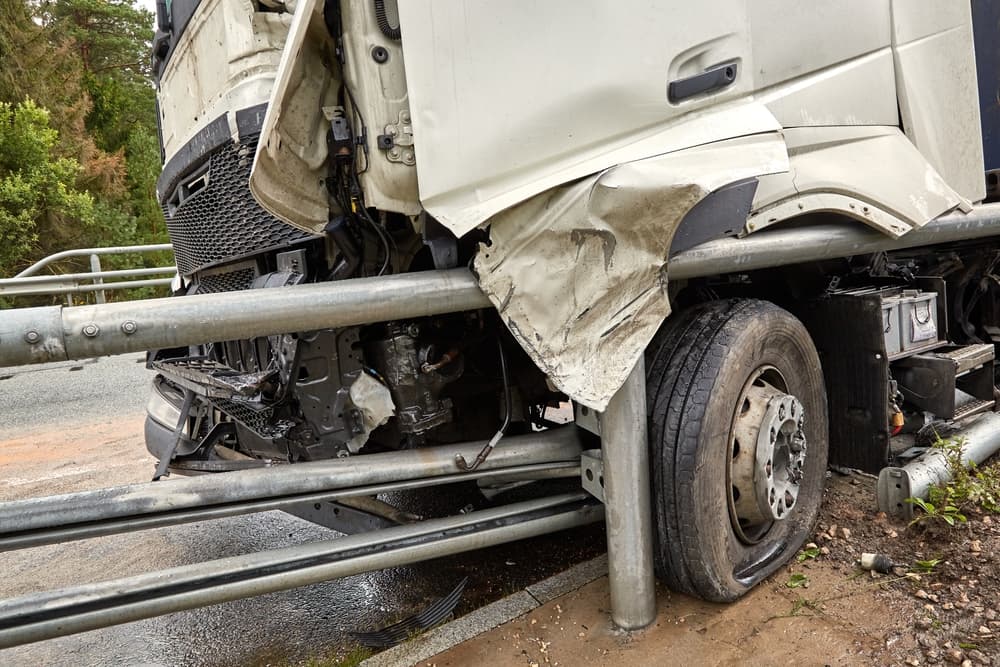Trucking accidents in Wisconsin are not just alarming statistics; they change the lives of those involved.
The different types of injuries one can suffer in truck accidents can add to the pain you are already feeling due to medical and legal issues.
The role of a personal injury attorney in guiding you through the legal maze is not only vital to your case but is often necessary.
After a semi or commercial vehicle accident injures you, contact an experienced Wisconsin truck accident lawyer for help.
Common Types of Injuries in Semi and Commercial Truck Accidents
Traumatic Brain Injuries (TBI)
Accidents involving heavy trucks often result in severe traumatic brain injury.
TBIs can have long-term consequences, affecting not just your physical abilities but also your cognitive functions. Legal claims for severe head injuries must account for long-term medical care and potentially lifelong effects on employment and quality of life.
Spinal Cord Injuries
Collisions can cause damage to the spinal cord, potentially leading to partial or complete paralysis. Spinal cord injuries typically require ongoing medical care and can result in permanent disability.
These injuries can be costly in terms of medical bills, lost wages, and diminished quality of life, making it crucial to understand the scope of your legal rights for financial recovery.
Fractures and Broken Bones
Broken bones are common, particularly fractures in the arms, legs, and ribs. Broken bones might seem straightforward, but the process of legal recovery can be complicated.
The severity and location of the fracture can affect your capacity to work and may involve extensive medical treatment and rehabilitation.
Internal Injuries
The force of a truck collision can cause internal bleeding or damage to organs that might not be immediately obvious. Internal injuries can deceive you because their symptoms aren’t always immediately obvious.
Their latent nature can make them contentious points in legal claims, as insurance companies may argue that they are unrelated to the accident.
Burns
Fuel explosions or fires post-collision can lead to severe burns that require extensive treatment.
Burn injuries often require specialized medical treatment, such as skin grafts and long-term care, making it vital to factor these into any legal claim for compensation.
Lacerations and Cuts
Shattered glass and metal can cause deep cuts that might require stitches or even surgery. While these injuries might seem minor, they can lead to complications like infections.
They can also be evidence of the force and trauma involved in the accident, potentially strengthening your claim.
Soft Tissue Injuries
This includes sprains, strains, and tears in muscles, ligaments, or tendons. Soft tissue injuries like sprains and strains might not show up on X-rays, but they can cause significant pain and limited mobility. Document these injuries carefully to substantiate your legal claim.
Amputations
Severe cases may crush or so severely damage limbs that amputation becomes necessary.
Amputations are life-altering and can lead to extensive medical bills, prolonged rehabilitation, and the need for prosthetics. These high-stakes scenarios involve complex legal strategies to secure fair compensation.
Whiplash and Neck Injuries
The sudden jolt from the impact often results in neck strain, commonly known as whiplash. Insurance companies often downplay whiplash injuries, but they can have lingering effects.
Proper documentation and legal strategy can achieve a fair settlement in these cases.
Psychological Trauma
Beyond physical injuries, victims often suffer from emotional and psychological trauma, including conditions like post-traumatic stress disorder (PTSD).
Emotional and psychological injuries like PTSD are increasingly recognized in truck accident cases; however, they can be hard to quantify, making the role of expert testimonies crucial in injury cases.
Facial Injuries
Impacts can cause facial fractures, dental injuries, or severe bruising. Facial injuries can have both physical and emotional impacts, affecting one’s self-esteem and mental health. Therefore, it is possible to seek compensation for both tangible and intangible damages.
Crush Injuries
Particularly in cases where smaller vehicles are pinned by the truck, victims may suffer from crush injuries that can lead to complications like compartment syndrome.
Crush injuries often involve multiple affected body parts and systems, requiring complex medical treatments.
Dislocations
The force of impact can cause joints to be forced out of their normal positions. A dislocated joint can affect your ability to work and may need surgical treatment. The ongoing nature of medical care should be factored into your truck accident claim.
Eye Injuries
Flying debris or shattered glass can lead to eye injuries, potentially causing permanent vision loss. Loss of vision or eye injuries could affect your quality of life and ability to work, making it essential to consider future care in your legal claims.
Herniated Discs
The force exerted on the spine may cause the discs between vertebrae to rupture or herniate, often requiring surgical intervention.
The back is necessary for most physical activities, and a herniated disc can affect your ability to work and enjoy life. Legal claims should consider both immediate and future financial losses.
Each type of injury presents its challenges and may require specialized medical care, which can be a significant financial burden. That’s why it’s essential to seek legal help to get the compensation you’re entitled to.
The Legal Aspects of Trucking Accidents
When you’re wrestling with the fallout of a trucking accident, it’s not just your physical and emotional well-being at stake.
The situation also carries important legal considerations. Legal elements like liability, evidence gathering, and financial recovery play into safeguarding your rights and receiving fair compensation.
Identifying Who is Responsible
A central question in any trucking accident is identifying who bears the blame. Most people will point fingers solely at the truck driver, especially if the crash involved reckless behavior, impaired driving, or exhaustion.
The reality is that the dynamics of a tractor-trailer crash require science and evidence to determine who is at fault for the accident.
If poor truck maintenance led to the accident, you can hold the company overseeing its upkeep liable.
Even the crew responsible for loading the truck might bear some responsibility if faulty cargo arrangements contributed to the accident.
The Need for Comprehensive Evidence
Collecting good evidence is vital in establishing fault and supporting your personal injury claim for damages.
This evidence might range from pictures of the scene and statements from witnesses to official police and medical reports.
Don’t overlook additional sources like dashcam footage or records from the truck’s onboard monitoring systems, which can provide valuable insights.
How a Personal Injury Lawyer Adds Value in a Trucking Accident

Hiring skilled legal help is often essential after experiencing a trucking accident. Your attorney can safeguard your rights, accumulate and analyze evidence, negotiate effectively with insurers, and represent you in court if the insurance company does not offer a fair and full settlement
By entrusting your truck accident case to a knowledgeable personal injury attorney in Wisconsin, you better your chances for a favorable outcome and can devote your energy to healing.
Understanding Financial Recovery Options
If you’re a victim of a trucking accident, you may be entitled to different types of compensation.
This can include past and future medical costs, ongoing care expenses, past and future lost income, as well as non-economic damages for pain, suffering, and emotional turmoil.
In some situations, the court may also award punitive damages to penalize the guilty party and discourage similar conduct in the future.
Timing Matters: The Statute of Limitations
A crucial but often overlooked legal aspect is the statute of limitations, which sets a time limit for initiating a lawsuit.
The time limit in Wisconsin is three years to file a personal injury lawsuit.
There are some exceptions, so it’s best to consult with a personal injury lawyer in Wisconsin with experience in truck accident cases because failure to adhere to these timelines can result in forfeiting your legal rights.
Contact a Wisconsin Truck Accident Lawyer at Pemberton Personal Injury Law Firm

If you or a loved one have suffered from a trucking accident in Wisconsin, professional legal guidance is a necessity.
Teaming up with a seasoned attorney offers not just emotional relief but also valuable guidance on what choices you have and the next actions that will help you and your family regain stability. There’s no need to go through the challenges that follow an accident by yourself.
The team at Pemberton Personal Injury Law Firm is committed to providing the legal support you need.
To explore the unique aspects of your situation and understand how a personal injury attorney at Pemberton Law in Wisconsin can assist you in your progress, call us at (608) 448-6242 or contact a truck injury lawyer online today to find out how we can help you.
 Calls Answered 24/7
Calls Answered 24/7









